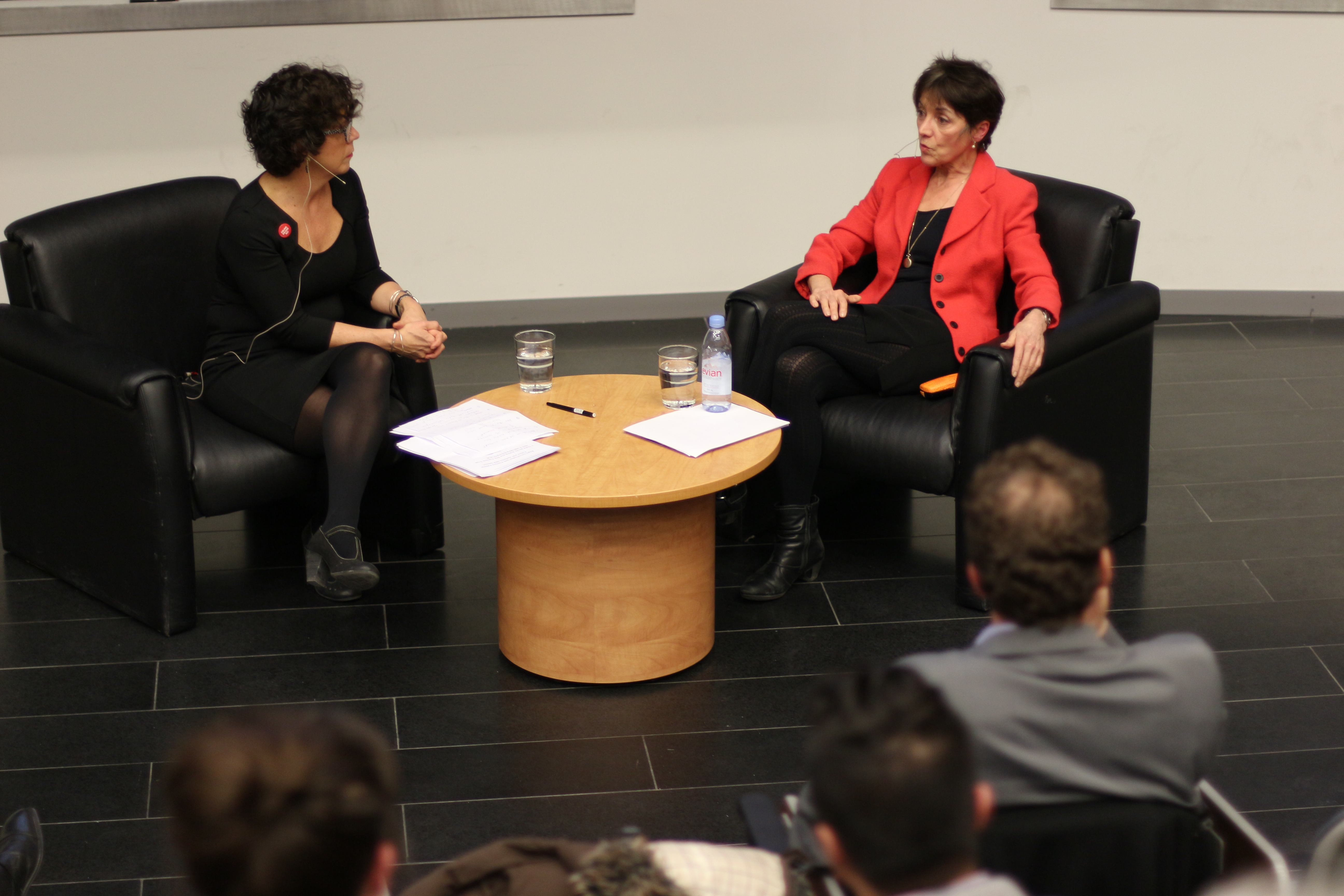Not even one headline calling out an “attack on feminists” or “assault on women or equal rights,” remembers award-winning journalist Francine Pelletier as she speaks about the 1989 Montreal Massacre. At the Concordia University annual journalism lecture on March 27, guest speaker Pelletier reminds the audience that shooter Marc Lepine actually told men to get out of the way as he shot and killed 14 women at École Polytechnique, while screaming that he hates feminists.
Pelletier says Polytechnique was a milestone — never before had women been singled out and mass murdered.
An investigative journalist, feminist and filmmaker, Pelletier says there is still a lot of bad news for women since Polytechnique, but there is also some good news: feminism is making a comeback.
First: the bad news.
Media coverage of the massacre on December 6, 1989, especially in Quebec, initially focused on the “crazed gunman” because people “needed to believe it had nothing to do with women.” The idea that women could be singled out in what Pelletier calls an act of terrorism was unfathomable! It took 25 years to agree collectively — police department included — that what happened in Montreal was a crime against the advancement of women.
Why did it take so long? The massacre took place on the eve of a new decade. Pelletier talks about the 1990s as the age of individualism and quips that people were too busy working out at the gym than to think about social movements.
In fact, feminism had become an “f” word as common wisdom dictated that women’s equality would just take care of itself. But we haven’t come such a long way, baby.
Fast forward 25 years and women still face gender inequality. Consider the fact that women work disproportionately in ‘female’ jobs in services, health, education and administration areas. There is still a steep climb when it comes to women in decision-making roles in government, media, business, science, technology, engineering and math, and other areas that shape society.
And, let’s not forget the wage gap. Across all provinces, there is a gender income gap for women in the workforce. Statistics Canada reports women make 64 per cent of what men earn, and 2/3 of minimum wage earners are women.
So what happened to women’s liberation? According to Pelletier, women have faced two major obstacles in the last 25 years: violence against women and hypersexualization.
Pelletier says the recent Jian Ghomeshi scandal is a perfect illustration of what women are up against. “Ghomeshi might prove to be the turning point because the scandal showed to what extent the violence women experience is in the grey zone,” says Pelletier.
For example, take the experience of Lucy DeCoutere who came forward to say that things just went from “smooching to smacking” when she was with Ghomeshi. Something just suddenly went wrong, and many women can relate to that. The high profile Ghomeshi scandal may be just what it takes for women to speak out and to be heard.
“Violence against women is the Western world’s dirty little secret,” suggests Pelletier, and it pushes women to the margins in the face of constant intimidation. This intimidation creates fear that feeds into women’s lack of confidence or what she calls the “inner jello” that holds women back.
That’s why #BeenRapedNeverReported was a watershed — the hashtag that created a global conversation about sexual assault received eight million hits on Twitter. The silence was broken, the wall of fear penetrated, at least on social media. Pelletier gave kudos to Sue Montgomery, former Montreal Gazette reporter who co-created the hashtag. Montgomery was in the room waiting for her turn up on stage to moderate a conversation with Pelletier.
Turning to the second major obstacle to gender equality, Pelletier says feminism had a role to play in hypersexualization. The women’s liberation movement has been co-opted by the advertising industry, which portrays hypersexualized images of women as empowerment.
“Women are not as free as they think,” concludes Pelletier, referring to a gap between what some women see as “girl power” and what some still label as “cheap.” This is supported in Sex, Truth & Videotape, a six-hour documentary series on women’s sexuality that she directed in 2004 and by research indicating that scantily clad women are dehumanized by men.
So, what’s the good news? There are signs that feminism is no longer a dirty word. In fact it’s becoming mainstream.
Pelletier highlights feminist stories in the news in the last six months: #BeenRapedNeverReported became a global movement; Patricia Arquette spoke out against women’s inequality at the Oscars; Emma Watson spoke to the United Nations about the HeforShe Campaign inviting men to join the struggle for gender equality; a street harassment video of woman walking in Manhattan went viral (40,000,000 views); and then there’s always Beyoncé.
It seems like the proverbial cat is out of the bag and the road to gender equality is in sight although: “We’re not there yet, much more needs to be done and hell yes, we’re willing to go the extra mile,” says Pelletier.
Elvira Truglia is a Montreal writer and works in communications, public engagement and community development. Her background spans national and international civil society organizations, arts and culture organizations and media outlets. The themes of voice, social change and empowerment are the threads weaving her diverse experiences together.



